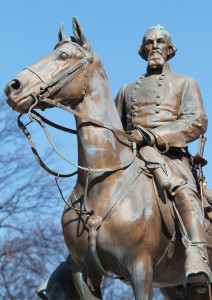 By now, everyone knows a Confederate battle flag waved over South Carolina’s capitol grounds because of a law — enacted by the long-gone legislators of another era, in protest of the civil rights movement — and it took legislative action to legally remove it.
By now, everyone knows a Confederate battle flag waved over South Carolina’s capitol grounds because of a law — enacted by the long-gone legislators of another era, in protest of the civil rights movement — and it took legislative action to legally remove it.
(It was subjected to an impromptu lowering a few days earlier, but the activist who took it down went to jail, and the flag went right back up the flagpole.)
Now, in Tennessee, a new controversy is erupting over another “southern heritage” icon.
Nathan Bedford Forrest was a Confederate cavalry general. He’s a controversial figure because his name is associated with the Ku Klux Klan in popular imagination, although historians doubt he played the role in the founding of the Klan that is often attributed to him. The fact he was a plantation owner and slave trader before the war doesn’t help his image, either.
Forrest was a native of Tennessee, a border state that joined the Confederacy. Many Civil War battles were fought on Tennessee soil. Forrest and his wife are buried in a Memphis city park, and his native state has showered him with honors. For example, tomorrow is his birthday, and Tennessee will officially honor him. Last month, Gov. Haslam signed a “Nathan Bedford Forrest Day” proclamation, not because he wanted to, but because a state law requires him to.
Not everyone in Tennessee is thrilled with the idea, but according to CBS News, “Forrest has had a day of observance in Tennessee for decades, [and] for that to change new legislation would be needed.” Some are pushing for just such a change. In Memphis, the city council voted last week to exhume the Forrests and move them to another location, although the city apparently can’t do that without approval of the Tennessee Historical Commission.
My point is, “southern heritage” is enshrined in the local culture of the South not necessarily because today’s residents — many of whom are blacks — want it to be, but because it was ensconced in the South’s laws at a time when white segregationists ran everything and blacks weren’t allowed to vote. This was done to make it impossible to remove Confederate flags, statues of Confederate heroes, or end such observances as Nathan Bedford Forrest Day. The South Carolina flag law, as you may recall from last week’s news reports, by its terms couldn’t be changed by a simple majority of the legislature but only by two-thirds supermajorities in both houses.
The preservation of “southern heritage” was never intended to be democratic. Its proponents meant to force it on the people of the South, whether they wanted it or not, for all time to come. This was done by giving it the protection of laws that were deliberately made difficult to repeal or change. The last Confederates died out decades ago, but they and their descendants were determined that future generations would be stuck with their legacy forever.
Democracy be damned.